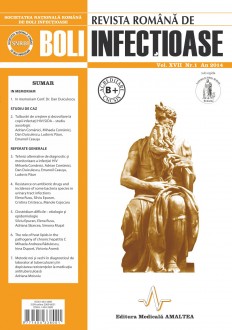SELECT ISSUE

Indexed

| |

|
|
|
| |
|
|
|

|
|
|
|
|
|
| |
|
|
HIGHLIGHTS
National Awards “Science and Research”
NEW! RJID has announced the annually National Award for "Science and Research" for the best scientific articles published throughout the year in the official journal.
Read the Recommendations for the Conduct, Reporting, Editing, and Publication of Scholarly work in Medical Journals.
The published medical research literature is a global public good. Medical journal editors have a social responsibility to promote global health by publishing, whenever possible, research that furthers health worldwide.
THE ROLE OF HOST LIPIDS IN THE PATHOGENY OF CHRONIC HEPATITIS C
Mihaela Andreea Radulescu, Irina Duport and Victoria Arama
ABSTRACT
Despite the innovations in the past years in the field of chronic hepatitis C treatment, Hepatitis C virus (HCV) infection remains an important global burden with elevated healthcare costs and high morbidity and mortality due to its complications – liver cirrhosis and hepatocellular carcinoma. The interrelation between HCV and host’s lipid metabolism is widely accepted, as it has been proved in many clinical and research studies. HCV infection is associated with different types of metabolic disorders such as liver steatosis and insulin-resistance. On the other side these metabolic disturbances induce an accelerated progression of liver disease. HCV interacts with host lipids in every step of viral life cycle: viral transport in the blood stream, cell entry, replication, assembly and transport to the extra-cellular space. This review focuses on the complex link between HCV and host lipids, emphasizing the clinical implications of these interactions. Although the pathogenic mechanisms of HCV infection are incompletely understood, recent literature data elucidates some important aspects which opened a road to innovating therapeutic approaches such as host targeting agents, with a pan-genotypic antiviral effect and high genetic barrier. Targeting parts of the pathogenic pathways of HCV infection represents a new kind of therapeutic approach, hopefully with higher treatment success rates and lowering morbidity and mortality related to this infection.
Keywords: chronic hepatitis C, lipid metabolism, pathogenesis
